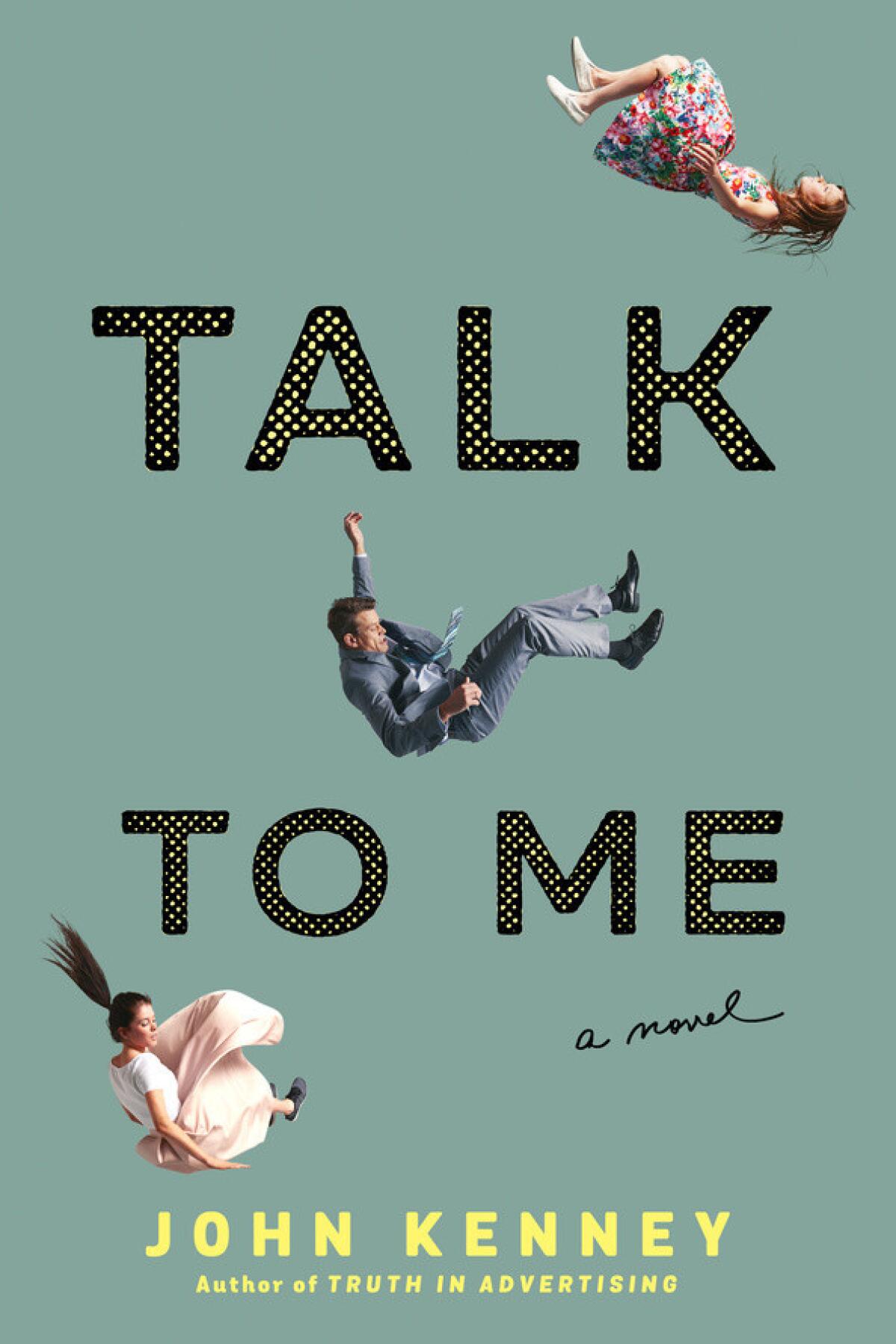Q&A: An unraveling TV anchor. Love poems for busy spouses. John Kenney’s new books chronicle our messy, modern lives
- Share via
John Kenney had a busy 2018. The Brooklyn resident is married with two young children and is a freelance copywriter for a major ad agency. But this year, he was also putting the finishing touches on his second novel, “Talk to Me” (out Jan. 15). And in his spare time, he wrote a book of poetry, “Love Poems for Married People,” which came out Dec 31.
While Kenney's first novel, “Truth in Advertising,” sprang from his years in that field, “Talk to Me” is more ambitious in scope, tracking the downfall of a network news anchor whose personal and professional life simultaneously collapse thanks to his self-absorbed missteps and today’s rapidly changing media environment.
By contrast, “Love Poems” offers quick and mordantly witty dissections of every little thing in a marriage, particularly in the arenas of communication and intimacy. The book has recently been optioned by Ryan Reynolds’ production company, Maximum Effort. “I’m stunned, thrilled and flattered that Ryan and his team like the book,” Kenney says. “As my wife said, ‘That’s amazing, considering that the poems aren’t that good.’”
Modest and affable, Kenney was readily amenable to changing our interview spot on a recent afternoon when his chosen pub was too noisy. Then Kenney took it in stride when he led us to his backup, a “quiet bakery” where the interview was disrupted by a young child throwing an epic seven-minute tantrum and then by the lone employee seemingly dropping every metal object in the place. “It's like doing an interview in a bowling alley,” he joked.
You wrote “Valentine's Day Poems for Married People” for the New Yorker a few years ago. How did it become a book?
In June, I was at a Penguin Random House cocktail reception and my editor introduced me to someone there who said, “I loved that. We should do a book.” The following week my editor said she would need a draft Aug. 1. I asked how many poems, and she said 70 or 75.
I was about to go on a TV commercial shoot in Spain, and I was editing the novel and, you know, trying to stay married. I wrote them in a sprint. I wrote more than 75 but a lot were quite terrible. Fortunately, those did not make the book. My wife is a spectacular writer and editor. She made these a lot better. I ran everything by her; if it makes her laugh, it's good.
Are your poems dark-yet-funny or funny-yet-dark?
Oh gosh. I hope they're darkly funny. I'm a fan of marriage and I'm happily married. But marriage is bizarre and difficult. It can be wonderful, but wonderful is not funny. I want the poems to be as ridiculous as possible, but they are based in a truth. A friend said the best way to describe his marriage is by saying, “What time is it?” It could be an awesome day or a terrible day, and it all could change in 10 minutes. That's what makes it interesting.
You have a line in “Truth in Advertising” where [the main character] Fin says he likes funny poems and ...
Really?
You don't remember that? I thought that was a reference to yourself.
No, prior to writing these for the New Yorker, I'd never done this before. Please know I would never reference myself. As someone who is the fifth of six boys, I would have been beaten senseless for doing that.

Your first novel obviously came from your work experience. With “Talk to Me,” were you drawn first to write about these characters or the ideas about media and social media that the book tackles?
Certainly I'm fascinated by the media, but it was the characters. I have a daughter — she will be 10 — and we're really close. But parenting can be hard, so I got to wondering what happens if you don't throw yourself into it. There was this idea of putting a huge job and money and prestige ahead of being the best father for his daughter.
Absent fathers were an issue in your first novel too.
You've talked to my therapist.
I find characters that are complicated, and initially maybe not so likable, very interesting. I don't want to be judged on my worst day. Haven't you ever come across someone you didn't like, and then you learn they just got horrible news or were in the middle of a divorce, and when you give them a chance, you find you like them?
The book is also about this reckoning for white male privilege. I'm not talking about #MeToo, about the Les Moonves type of sociopathic, predatory people. This is about screaming at someone, about using power and privilege against a weaker person.
“Truth in Advertising” was first-person, but this time you switched to third. Why?
I liked the voice of Fin in my first book and felt I could run a marathon with that. But for this book I wanted a much wider lens, so we can see so many different things instead of limiting it to one perspective.
Did you think about Howard Beale while writing about a troubled news anchor?
It would have been impossible not to. It's one of my favorite movies. I pay homage by including a reference to “Network” in a scene at a party. So of course it was an influence, but I didn't want a “mad man” as my character.
Neither the nightly news nor the more modern media and social media come across particularly well in “Talk to Me.”
The nightly news has become is a redundant outdated thing. By the time it's on, we know everything already. But also, these men and women live in a bubble world, where they become part of the story. It takes a very strong character to not let that go to your head, to not become center of the world and take people around you for granted.
Social media is still early days; it's just a few thousand days old. It's the Wild West. What's going to be interesting is what it becomes. It has the power to become a democratic force. Look at the Arab Spring or #MeToo movement; that doesn't happen 30 years ago with a letter to the editor. I'm by no means against it. But in its current form, it is often really brutal; it's the cool kid table in the lunchroom.
George Saunders once said his only regret is not being kinder in his youth. I just find kindness so beautiful and powerful and heart-stopping. I don't know if today is a crueler time — we've done a pretty good job as a society over the millennia of being unkind — but we've never lived in a time with this speed and constant barrage of shockingly unkind, unempathetic behavior. All it takes sometimes is someone reaching across the divide. And the book asks, “What is the quality of mercy?” Not just from a societal point but within a family.
Stuart Miller is the co-author of The Other Islands of New York City"

Sign up for our Book Club newsletter
Get the latest news, events and more from the Los Angeles Times Book Club, and help us get L.A. reading and talking.
You may occasionally receive promotional content from the Los Angeles Times.







